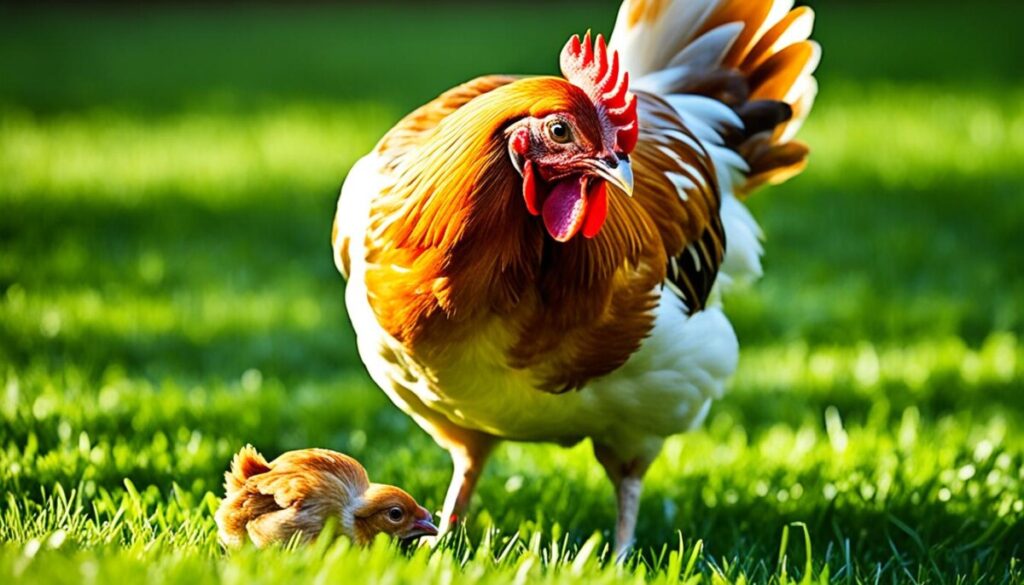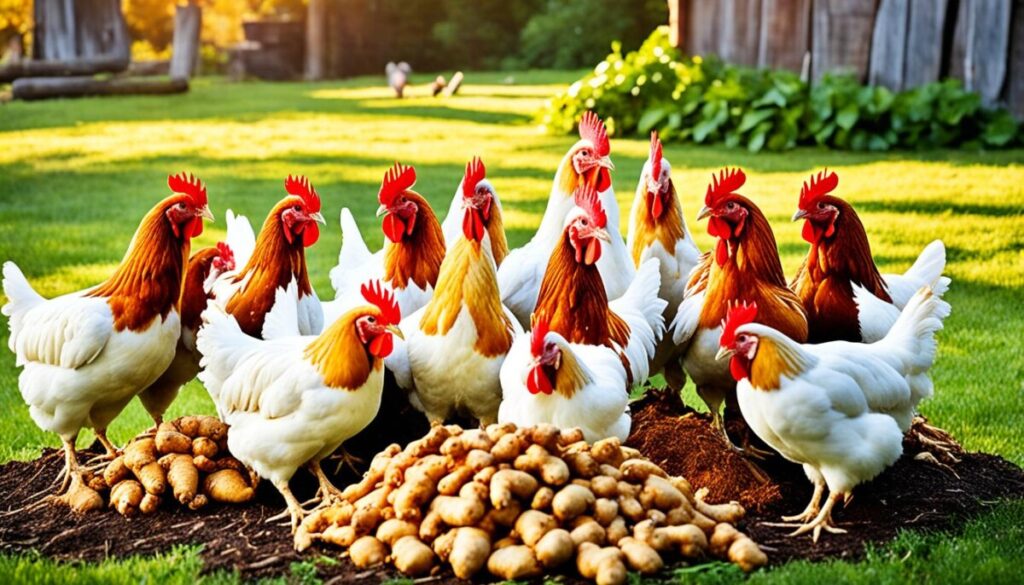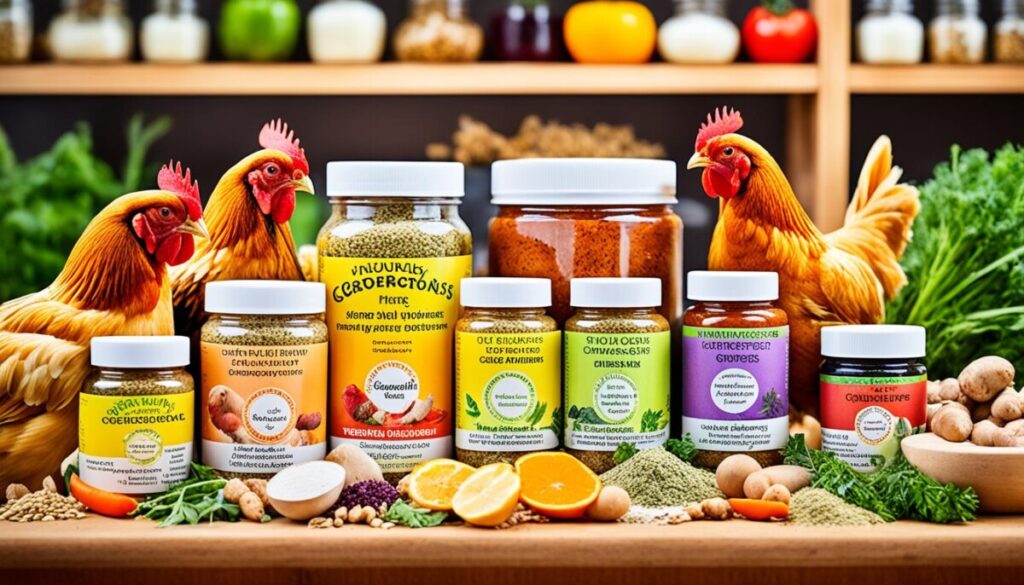Ginger is a popular spice known for its versatility in cooking and numerous health benefits. But have you ever wondered if chickens can eat ginger too? In this article, we will explore whether ginger is safe for chickens and the potential benefits it can offer to their overall health and well-being.
Key Takeaways
- Ginger can be safely incorporated into a chicken’s diet as a supplement.
- It is a great appetite stimulant and stress reducer for chickens.
- Ginger is rich in vitamins and minerals that contribute to poultry health.
- Feeding chickens ginger a couple of times a week is sufficient to reap its benefits.
- Monitor the overall diet of your flock to ensure balanced nutrition.
The Nutritional Profile of Ginger
Ginger is not only flavorful but also packed with nutrients. Its nutritional profile makes it a valuable addition to your chickens’ diet, offering various health benefits. Let’s explore the vitamins, minerals, and other compounds present in ginger that contribute to overall chicken health.
Vitamins in Ginger
Ginger contains essential vitamins that support various bodily functions in chickens. These vitamins include:
- Vitamin B6: It plays a crucial role in metabolizing carbohydrates, proteins, and fats. It also aids in the synthesis of red blood cells, promoting circulation and overall health.
- Vitamin C: This potent antioxidant strengthens the immune system, helping chickens combat infections and diseases.
- Vitamin E: With its antioxidant properties, vitamin E protects cells from damage caused by free radicals, promoting healthy skin and feathers.
Minerals in Ginger
Ginger is rich in minerals that contribute to various physiological processes in chickens. These minerals include:
- Magnesium: It plays a crucial role in enzyme function, energy production, and the development and maintenance of bone health in chickens.
- Manganese: This mineral supports the metabolism of proteins, carbohydrates, and fats, ensuring optimal growth and development in poultry.
- Iron: Essential for carrying oxygen in the bloodstream, iron supports overall circulatory health in chickens.
Ginger also contains compounds like shogaol and gingerol, which have antioxidant properties. These compounds help combat oxidative stress, promoting gut health and enhancing digestive processes in chickens.
Overall, ginger’s nutritional profile, enriched with vitamins, minerals, and antioxidants, contributes to various aspects of chicken health, including digestive health, circulatory health, and strong eggshells in laying hens.
| Nutrient | Amount per 100g of Ginger |
|---|---|
| Vitamin B6 | 0.16 mg |
| Vitamin C | 5 mg |
| Vitamin E | 0.26 mg |
| Magnesium | 43 mg |
| Manganese | 0.23 mg |
| Iron | 0.6 mg |
Research Study on Ginger and Egg Laying Performance
A research study conducted on hens examined the effects of ginger supplementation on their egg laying performance. The study aimed to determine whether incorporating ginger powder into the hens’ diet would have any significant impact on their egg production and quality.
The study involved 675 Hyline brown hens, which were divided into 5 control groups. Each group was given a different amount of ginger powder per kilogram of feed. The researchers closely monitored the hens’ laying performance, including the mass of the eggs and the antioxidant levels in the yolks.
The findings of the study revealed that hens supplemented with ginger powder showed improved egg laying performance compared to the control groups. These hens laid eggs with a higher mass and had higher levels of antioxidants in their yolks. This suggests that incorporating ginger into the hens’ diet positively influenced their egg production and quality.
The study concluded that the optimal amount of ginger powder for laying hens is between 10-15 grams per kilogram of feed. This amount resulted in significant improvements in egg laying performance without any adverse effects on the hens’ health.
Ginger supplementation for laying hens can be a valuable approach to enhance egg production and promote the overall well-being of the flock. By incorporating ginger into their diet, chicken farmers can potentially improve their egg output and provide consumers with high-quality eggs rich in antioxidants.
Key Findings:
- Ginger supplementation improved egg laying performance in hens.
- Hens supplemented with ginger powder laid eggs with a higher mass.
- Antioxidant levels in the yolks of hens fed with ginger were higher.
- The optimal amount of ginger powder for laying hens is between 10-15 grams per kilogram of feed.
Feeding Ginger to Chickens
Chickens can eat ginger in various forms. They can consume raw ginger, which is the preferred method as it maximizes the nutritional content. Feeding chickens raw ginger ensures they receive the maximum health benefits associated with this spice. Additionally, ginger leaves can also be safely consumed by chickens. While cooked ginger can be given to chickens, it is best to feed them raw ginger to optimize its potential benefits.
When preparing ginger for chickens, it is recommended to grate it or cut it into small pieces. This makes it easier for them to eat and digest. By breaking it down into manageable portions, chickens can easily consume and derive the nutritional advantages that ginger provides. Whether it’s added to their regular feed or served separately, chickens can enjoy the benefits of ginger in their diet.
“Feeding chickens raw ginger allows them to reap the maximum nutritional benefits.”
Health Benefits of Ginger for Chickens
Ginger offers several health benefits to chickens. Its natural properties contribute to improved digestive health and reduce inflammation in the digestive tract.
Ginger is rich in antioxidants, which play a vital role in promoting overall well-being for chickens. These antioxidants help combat cellular damage and protect the body’s cells from oxidative stress. The antioxidants in ginger can also contribute to better egg quality by enhancing the production of antioxidants in egg yolks, resulting in healthier and more nutrient-rich eggs.
In addition to its antioxidant properties, ginger is known to possess anti-inflammatory effects. By reducing inflammation in the digestive tract, ginger allows chickens to absorb and derive maximum nutrition from their food, leading to better overall health and vitality.
The various vitamins and minerals found in ginger also contribute to the well-being of chickens. For example, ginger contains vitamins such as B6, C, and E, which are essential for healthy skin, feathers, and skeletal health. These vitamins also support the proper functioning of the circulatory system in chickens.
The following table provides an overview of the key health benefits of ginger for chickens:
| Health Benefits of Ginger for Chickens |
|---|
| Improves digestive health |
| Reduces inflammation in the digestive tract |
| Enhances antioxidant production in egg yolks |
| Promotes healthier and more nutrient-rich eggs |
| Supports healthy skin, feathers, and skeletal health |
| Contributes to the proper functioning of the circulatory system |
With its numerous health benefits, ginger can be a valuable addition to your chickens’ diet. Incorporating ginger into their feed or offering it as a supplement a few times a week can help optimize their overall well-being and contribute to their growth and productivity.
Buying and Growing Ginger for Chickens
When it comes to incorporating ginger into your chickens’ diet, there are two options: buying ginger or growing it yourself. Both options have their advantages, so let’s explore them.
Buying Ginger for Chickens
If you choose to buy ginger for your chickens, it is important to opt for organic ginger to ensure the highest quality and safety for your flock. Organic ginger is grown without the use of harmful pesticides, making it a healthier choice for your chickens. By buying organic ginger, you can provide your chickens with a natural and nourishing treat while minimizing their exposure to potentially harmful chemicals.
Organic ginger can be easily found at local farmer’s markets, health food stores, or online retailers that specialize in organic produce. Make sure to check the labels and certifications to ensure that the ginger you purchase is indeed organic.
Growing Ginger for Chickens
If you prefer to have complete control over the growing process and ensure the organic nature of the ginger, you can choose to grow it yourself. Growing ginger can be a rewarding experience and provides you with fresh, pesticide-free ginger for your flock.
To grow ginger, you need a warm climate as ginger thrives in temperatures between 70°F to 85°F (21°C to 29°C). It requires well-drained soil enriched with plenty of organic matter. Choose a sunny spot in your garden or use containers if you have limited space. Plant ginger rhizomes in the spring, making sure that each piece has at least one bud. Keep the soil consistently moist and provide regular watering.
Ginger plants take about 8 to 10 months to mature, and you can harvest them once the leaves turn yellow and start to dry. Simply dig out the rhizomes, rinse them off, and they are ready to be fed to your chickens.
Ginger for Your Chickens
Ginger is a wonderful supplement for chickens, whether you buy it or grow it yourself. Its health benefits can contribute to the overall well-being of your flock, and the taste will surely be appreciated by your feathered friends.
| Ginger for Chickens | Benefits |
|---|---|
| Buying Ginger | – Convenient option – Access to organic ginger – Minimize pesticide exposure |
| Growing Ginger | – Complete control over growing process – Fresh and organic ginger – Cost-effective |
Whether you choose to buy ginger or grow it yourself, incorporating this flavorful spice into your chickens’ diet can provide them with additional nutrition and health benefits. With organic ginger, you can nourish your flock while promoting their overall well-being. Start exploring the benefits of ginger for your chickens today!
Frequency of Ginger Consumption for Chickens
Ginger can be a valuable addition to your chickens’ diet, but it should not be the main component. Incorporating ginger into your chickens’ diet a couple of times a week can provide them with the benefits of this versatile spice. To ensure a balanced nutritional intake, you can mix ginger into their feed or other foods they consume. It’s important to monitor your chickens’ overall diet and make adjustments as needed.
Benefits of Incorporating Ginger into Chicken Diet
Incorporating ginger into your chickens’ diet can offer various benefits to support their health and well-being. Here are some key advantages:
- Improved Digestion: Ginger aids digestion by stimulating the production of digestive enzymes and promoting a healthy gut. It can alleviate digestive issues and improve nutrient absorption in chickens.
- Boosted Immune System: The antioxidants present in ginger help strengthen the immune system of chickens, making them more resilient to common infections and diseases.
- Reduced Inflammation: Ginger contains anti-inflammatory properties that can help alleviate inflammation in chickens, particularly in the digestive tract. This can improve overall comfort and health.
- Promoted Circulatory Health: Ginger improves blood circulation in chickens, ensuring that vital nutrients are efficiently delivered throughout their bodies.
Incorporating ginger into your chickens’ diet in moderation can provide these benefits without overwhelming their digestive system.
Monitoring Ginger Consumption
When incorporating ginger into your chickens’ diet, it’s important to monitor their consumption and adjust accordingly. Overfeeding ginger can lead to gastrointestinal discomfort or upset. Here are some guidelines for monitoring ginger consumption:
- Start with small amounts: Begin by introducing small amounts of ginger into their diet and observe their response. If there are no negative effects, you can gradually increase the amount.
- Observe their behavior and health: Monitor your chickens’ behavior and overall health after incorporating ginger into their diet. Look for any signs of discomfort or digestive issues. If any adverse effects are noticed, consult with a veterinarian.
- Balance with other nutrients: Ginger should be part of a balanced diet for chickens. Ensure they receive a variety of other essential nutrients to meet their dietary needs.
By monitoring their ginger consumption and considering their overall nutritional requirements, you can ensure your chickens benefit from the addition of ginger in their diet.
Frequency of Ginger Consumption for Chickens
| Ginger Consumption | Frequency |
|---|---|
| Ginger supplementation | A couple of times a week |
| Mixing ginger into feed | As desired, but in moderation |
| Monitoring ginger intake | Observe chickens’ response and adjust accordingly |
Precautions and Risks of Feeding Ginger to Chickens
While incorporating ginger into your chickens’ diet can offer various benefits, it is essential to take certain precautions to ensure their safety and well-being. Here are some important considerations when feeding ginger to chickens:
- Avoid harmful ingredients: When preparing ginger for your chickens, make sure to avoid adding any harmful ingredients such as salt, butter, sugar, or excess oil. These substances can be harmful to chickens and should not be included in their diet alongside ginger.
- Choose organic ginger: Be cautious of pesticides or chemicals on store-bought ginger. Opt for organic varieties whenever possible to ensure that your chickens are not exposed to potentially harmful substances.
- Introduce ginger gradually: If you plan to introduce ginger to chicks, it is best to wait until they are at least 8 weeks old. Young chicks’ stomachs may be sensitive to intense flavors, so it is important to introduce ginger gradually to avoid any digestive discomfort.
By following these precautions, you can safely incorporate ginger into your chickens’ diet and minimize any potential risks associated with its consumption. Remember to always prioritize the health and well-being of your flock.
Risks and Precautions of Feeding Ginger to Chickens
| Risks | Precautions |
|---|---|
| Ginger prepared with harmful ingredients | Avoid adding salt, butter, sugar, or excess oil when preparing ginger for chickens. |
| Pesticides on store-bought ginger | Opt for organic ginger to minimize exposure to harmful chemicals. |
| Introducing ginger to young chicks | Wait until chicks are at least 8 weeks old before gradually introducing ginger to their diet. |
Other Natural Health Products for Chickens
Ginger is not the only natural health product that can benefit chickens. There are several other natural products and herbal treatments available that can improve the overall well-being of your flock. Incorporating a combination of these natural health products can enhance the health and vitality of your chickens.
1. Diatomaceous Earth
Diatomaceous earth is a natural and organic product that can help control external parasites, such as mites and lice, in chickens. It is a fine powder made from the fossilized remains of tiny marine organisms called diatoms. When applied to the chicken coop or directly to the chickens’ feathers, it works by dehydrating the parasites, effectively controlling their population. Diatomaceous earth is safe for chickens to ingest and helps promote healthy digestion by acting as a natural dewormer.
2. Immune-Boosting Treats
Boosting your chickens’ immune system is essential for maintaining their overall health and preventing diseases. There are various homemade treats you can provide to support their immune system. Ingredients such as garlic, oregano, and turmeric can be added to their regular feed or given as special treats. These ingredients have natural antibacterial and antiviral properties that can help strengthen their immune response and keep them healthy.
3. Dietary Supplements
In addition to a well-balanced diet, chickens can benefit from certain dietary supplements that provide specific nutrients essential for their health. Calcium supplements, such as oyster shells or crushed eggshells, aid in the formation of strong eggshells in laying hens. Probiotic supplements promote a healthy digestive system by introducing beneficial bacteria. Omega-3 supplements derived from flaxseed or fish oil can enhance the nutritional value of eggs produced by your chickens.
4. Herbal Treatments
Herbal treatments have been used for centuries to support chicken health and well-being. Herbs like chamomile, lavender, and calendula can have calming effects on chickens, helping to reduce stress and promote relaxation. Garlic and wormwood are natural dewormers that can help control internal parasites. Herbal treatments can be administered as infused teas, added to their feed, or sprinkled in their bedding.
By incorporating these natural health products and herbal treatments into your chickens’ care routine, you can provide them with a holistic approach to their well-being. Remember to always consult with a veterinarian or poultry expert for guidance on the appropriate usage and dosage of these products for your specific flock.
Conclusion
In conclusion, ginger can safely be incorporated into your chickens’ diet as a supplement. It offers various health benefits, including improved digestive health, antioxidant-rich egg yolks, and overall well-being for chickens. Ginger’s nutritional profile is packed with vitamins and minerals that contribute to their overall health. By feeding them raw ginger, you can maximize the nutritional content they receive. However, it is important to monitor the frequency of ginger consumption and ensure it is given as a supplement rather than the main component of their diet.
When incorporating ginger into your chickens’ nutrition, it is crucial to take precautions. Avoid feeding them ginger prepared with harmful ingredients such as salt, butter, sugar, or excess oil, as these can be harmful. Ensure that the ginger you buy is of organic origin, free from harmful pesticides. Introduce ginger to chicks after they are 8 weeks old, as their stomachs may be sensitive to intense flavors at a young age.
While ginger is a beneficial addition to your chickens’ nutrition, it is not the only natural health product available. There are several other natural products and herbal treatments that can improve the overall well-being of your flock. Consider incorporating a combination of these products to enhance the health and vitality of your chickens.





